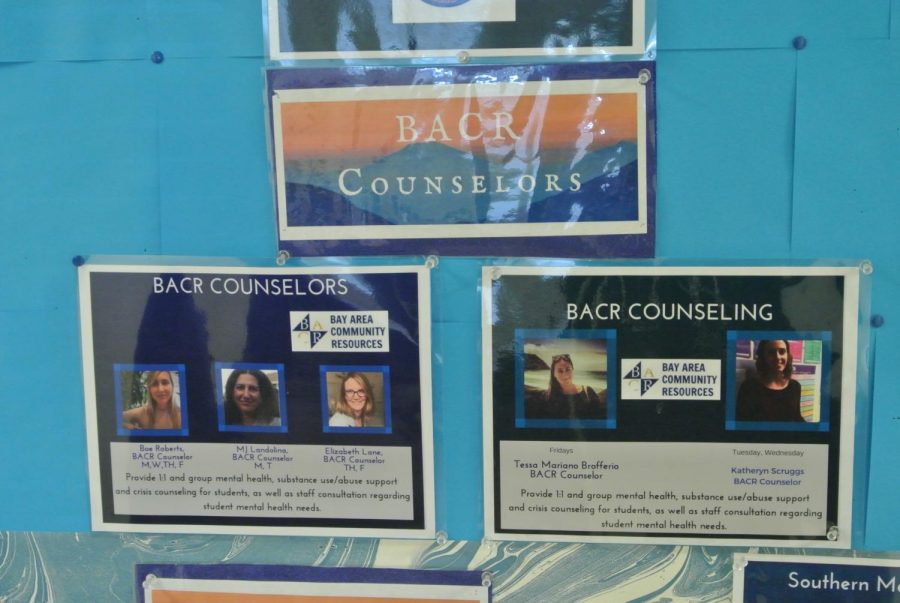Proposed cuts to counseling service met with community backlash
Feb 6, 2019
The proposed $3 million budget reduction plan for the Tamalpais Union High School District (TUHSD) included, among other cuts, a reduction of Bay Area Community Resource (BACR) services by 50 percent in order to save a projected $209,500 annually. The BACR cuts have received a significant amount of pushback by the public compared to the other items on the draft fiscal advisory recommendation.
BACR is an organization that provides on-campus counselors who work individually and in groups with around 300 students a year at Tam. They work with students to address a wide variety of issues, including depression, anxiety, self-esteem, problems with peers, alcohol and drug use, divorce adjustment, and other family issues.
“My experience with BACR came about when I was facing hardship with my family, which turned a mild anxiety disorder I’d had for years into debilitating anxiety around my academic and social life,” a senior, who asked to remain anonymous in order to discuss personal issues, said. “[Having] a safe space in the midst of a stressful school environment was so important.”
The proposed cut would significantly affect the students who use BACR, as well as BACR employees.
“The reality is that fewer students will have access to critical support at school, and BACR is often the only access that students have to counseling because private therapy can be cost-prohibitive,” BACR clinical staff member Elizabeth Lane said. “BACR’s most critical purpose at Tam is crisis assessment. We are on the front lines in evaluating whether students need immediate intervention to ensure their safety. This work is essential and can truly save lives.” Lane is also a licensed marriage and family therapist.
The proposed cuts do not specify which aspects of BACR will be limited or taken away altogether. According to Lane, BACR’s main focus and concern is around the potential impact of the budget cut on students, and making sure students are safe.
“A 50 percent reduction in BACR funding will almost certainly strain the counselors and Wellness team, limiting the depth and range of services that they are currently providing,” Lane said.
At a January 29 Tam forum to discuss the fiscal advisory recommendation, community members were critical of the proposed BACR cuts.
“So all I can say to you is that the committee went through a process and we will take feedback,” Taupier said in response to a parent who had expressed concern over students’ mental health should the cuts be approved. “I think to them they were still providing a service, they weren’t eliminating it, and trying to find some balance there.”
The Wellness Center, a program which provides mental and sexual health services, is not one of the items on the drafted list of budget cuts, although the two are fundamentally connected, according to Wellness Center coordinator Hannah Wright.
“As the wellness coordinator, I get all the mental health support requests from teachers, school counselors, parents, admin, etcetera. I then call the students down and assess their needs. If I think a BACR therapist is appropriate, I will then link the student up with a BACR therapist,” Wright said.
The Wellness Center’s purpose is to improve the health, well-being, and education outcomes of all students through on-campus counseling and different programs. Cutting BACR by 50 percent would also impact the Wellness Center’s capability to continue educating students and getting them the help they need as it “would dramatically decrease our ability to provide one to one mental health counseling here at Tam,” according to Wright.
According to Lane, BACR’s positive impact on Tam begins with the counselors outlook on their role in the Tam community. “My hope is that students feel supported and encouraged by the the BACR counselors, know that they are not alone with the difficulties they’re facing, and learn new skills to cope with challenges in positive ways,” Lane said.
For some students, Lane’s hopes are fufilled. “My BACR counselor taught me coping mechanisms for anxiety [such as breathing exercises]that I still use to this day. I wish more people with anxiety, depression, and other mental health struggles knew about BACR at Tam because it is such a great resource,” the anonymous senior said.
A board meeting will be held at Redwood on February 12 at 6 p.m. where members of the public will be able to speak about the draft fiscal advisory recommendation. The board will then vote to approve or disapprove any items on the revised final recommendation at a board meeting at Redwood on February 26 at 6 p.m., determining the fate of the BACR services.
Photo by Logan Little.




